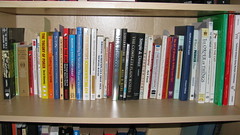How To Write A Movie Script – Screenwriting Tips
How To Write A Movie Script – Screenwriting Tips
So you want to be a screenwriter, but where do you start? What tools and resources are necessary to learn to be a screenwriter? Do I have to spend a lot of money to get started? These are all common questions, which I will answer in this article.
Easy tips on how to write a movie script:
1) Read as many screenplays as you can. Learn the format and language of how screenplays are constructed. For instance, screenplays are always written in the present tense and often use minimal description to set scenes and create atmosphere. The rule of thumb is: never write more detail than you need. There is a standard shorthand that is common to most scripts, as well as certain terminology that is used to set up scenes and indicate transitions. Reading lots of screenplays will allow you to learn how professional screenwriters
use this jargon. You can pick up some free screenplays to study at ScreenwritingTips.com.
2) Use computer software to format your scripts. As mentioned above, to succeed in Hollywood, you have to use proper screenplay formatting and jargon. People who work in the industry are used to screenplays following an accepted format and layout. If yours does not, you are out of the ball game before it has even started. If you’ve got the money to spend (0-200), I suggest Movie Magic Screenwriter as the software of choice. In my opinion, it FAR SURPASSES the competition, even the prevalent and ever-popular Final Draft. If your budget is tight, there are also many low-cost software options available (under 0), as well as free templates that plug into MS Word.
3) Learn to outline your stories. You can do this on a computer, or you can
use the “traditional” method of breaking down your screen story through the use of index (3×5) cards. Either method will allow you to move your scenes about and find the proper flow of your story. During this process, you may discover “miracles” that will take your story to the next level… or you may find out that that “precious” scene you’ve been thinking about is not even needed! Beginners often have too much material for their story, or too little. They must find the happy medium. Outlining helps get clarity and allows you to see what can be chopped or what must be enhanced. Storytelling is an art.
4) Purchase some screenwriting books to help you learn the process of storytelling and how to structure your story. William Goldman, screenwriter extraordinaire, is famous for saying that screenplays are, “Structure, structure, structure.” Movies don’t
have time to meander like novels. They need to be tightly constructed, with no flab. There are some great books on the market. Hit your local bookstore to familiarize yourself with a few. One of my favorites on how to write a commercial screenplay is Blake Snyder’s SAVE THE CAT! Snyder really focuses on the importance of your STORY IDEA and how crucial it is to creating a screenplay that will sell in today’s Hollywood. I also like HOW TO WRITE SCREENPLAYS THAT SELL by Michael Hauge because it starts with the basics and lays out proper story construction. It’s an easier book to get a grasp on and is great for beginners.
For more killer FREE tips on scriptwriting, go to Screenwriting Tips. Sign up to receive FREE SCREENPLAYS that you can use to learn How to Write a Movie Script and become a successful screenwriter.
Article from articlesbase.com

